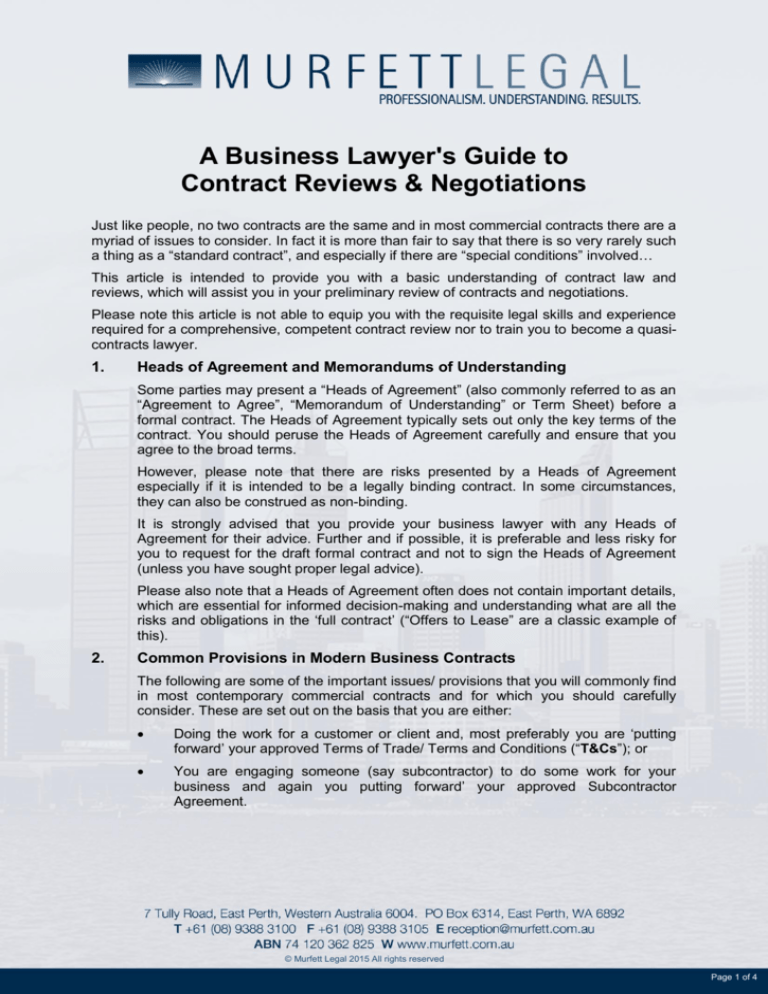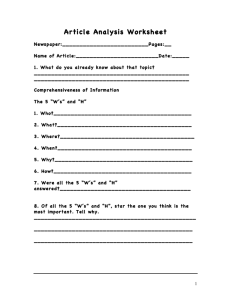
A Business Lawyer's Guide to
Contract Reviews & Negotiations
Just like people, no two contracts are the same and in most commercial contracts there are a
myriad of issues to consider. In fact it is more than fair to say that there is so very rarely such
a thing as a “standard contract”, and especially if there are “special conditions” involved…
This article is intended to provide you with a basic understanding of contract law and
reviews, which will assist you in your preliminary review of contracts and negotiations.
Please note this article is not able to equip you with the requisite legal skills and experience
required for a comprehensive, competent contract review nor to train you to become a quasicontracts lawyer.
1.
Heads of Agreement and Memorandums of Understanding
Some parties may present a “Heads of Agreement” (also commonly referred to as an
“Agreement to Agree”, “Memorandum of Understanding” or Term Sheet) before a
formal contract. The Heads of Agreement typically sets out only the key terms of the
contract. You should peruse the Heads of Agreement carefully and ensure that you
agree to the broad terms.
However, please note that there are risks presented by a Heads of Agreement
especially if it is intended to be a legally binding contract. In some circumstances,
they can also be construed as non-binding.
It is strongly advised that you provide your business lawyer with any Heads of
Agreement for their advice. Further and if possible, it is preferable and less risky for
you to request for the draft formal contract and not to sign the Heads of Agreement
(unless you have sought proper legal advice).
Please also note that a Heads of Agreement often does not contain important details,
which are essential for informed decision-making and understanding what are all the
risks and obligations in the ‘full contract’ (“Offers to Lease” are a classic example of
this).
2.
Common Provisions in Modern Business Contracts
The following are some of the important issues/ provisions that you will commonly find
in most contemporary commercial contracts and for which you should carefully
consider. These are set out on the basis that you are either:
Doing the work for a customer or client and, most preferably you are ‘putting
forward’ your approved Terms of Trade/ Terms and Conditions (“T&Cs”); or
You are engaging someone (say subcontractor) to do some work for your
business and again you putting forward’ your approved Subcontractor
Agreement.
© Murfett Legal 2015 All rights reserved
Page 1 of 4
You should be aware of and understand the effects (and differences) the following
clauses:
Insurances;
Indemnities and Warranties;
Defects and Liability;
Limitations of liability;
Liquidated damages (think 'monetary penalty' but not exactly);
Default and Termination (tip: watch for ‘termination for convenience’ clauses);
Retention of title, Retention Sums and the Personal Property Security Act;
Direct and consequential losses;
Notices; and
Incorporation of other ‘documents’ into the contract eg. annexures, schedules,
policies, head contracts (note these can be just as legally binding as the main
T&Cs, so be sure that you’ve obtained and agreed to all of these).
You should ensure the following clauses are acceptable and/or incorporated:
Satisfactory payment terms;
Security for payment;
Ability (or first right) to rectify any defects in the goods and/or services;
Ownership of Intellectual Property Rights;
Variations to the works;
Extension of time;
Protective Covenants (e.g. ‘anti-poaching’ of key staff, clients, suppliers etc.)
and Restraints of Trade* (limited enforceability but can be done subject to
specific legal advice);
Confidentiality;
Assignment, novation, sub-contracting;
Dispute resolution;
Force Majeure/ ‘Acts of God’
Jurisdiction/ Governing Laws
Entire agreement clause; and
Further assurances.
© Murfett Legal 2015 All rights reserved
Page 2 of 4
3.
Committing to or Accepting a Contract
For many reasons you should not commit or execute any contract before seeking
proper legal advice. Once a contract is entered into, you may find it very difficult to
negotiate variations or amendments.
If you do not fully or properly perform the contract or are unable to carry out all of its
obligations, this can and often attract serious adverse legal and financial
consequences; including but not limited to claims for damages (e.g. loss of profits)
and also your insurers may not agree to indemnify you for any insurable claims, if
they haven’t approved another party’s contract you accepted.
For these reasons, we recommend that you seek our advice and approach us at an
early stage for our inputs, before any formal negotiations begin.
Lastly, we understand that from time to time clients and other parties may present
their T&Cs to you after they have received and accepted your T&Cs. In contract law,
this is known as “battle of the forms”. Each T&C constitutes a counter-offer and the
last offered T&Cs (and even with variations), that are “accepted”, stands.
It is therefore important to be vigilant and ensure that you, your employees, agents or
subcontractors do not mistakenly or inadvertently accept the client’s T&Cs after the
client had purportedly accepted your T&Cs.
In addition, it may be more prudent for you not to perform or commence any work (if
commercially viable) before the client formally acknowledges and confirms it has
accepted your T&Cs. We also recommend drafting appropriate provisions in T&Cs to
expressly state that they will prevail in the event the client purports to present its
T&Cs at a later stage.
4.
How to Properly Engage and Use a Business Lawyer
When you are presented with another party’s contract, the best way to utilise your
business lawyer’s skills and experience is, after your preliminary but careful review of
same, to then send it on to your business lawyer (with any specific queries or issues
you may have) so that we can assist you to identify any additional key legal risks and
provide you with appropriate advice on the entire contract.
Further a good business lawyer can also add value by advising you of other options
and provisions that could apply to a contract (and its contemplated commercial
transactions(s)), which you may not have considered or even known about.
Also whilst some inexperienced clients think that they may only need one particular
provision or area of their contract reviewed but, as “you won’t know what you don’t
know” about the intricacies of contract law and commercial negotiations, we always
recommend that you instruct us to undertake a full legal review of the contract.
Otherwise it could be like: if you had severe chest/ heart pains but instructed your
doctor that you only wanted them to check your blood pressure…
5.
Making an Informed Decision
Once we have provided you with our advice, your options and our recommendations
in relation to the Contract (yes, a good business lawyer should provide you with
© Murfett Legal 2015 All rights reserved
Page 3 of 4
appropriate, practical recommendations – not just the contract restated to you in
‘legalese’ and telling you all the problems with it!).
You will then be in a position to make a fully informed decision about, and effectively
negotiate and then accept, the Contract with the other party.
Article written by Tom Meagher: Director – Corporate
Commercial Law
Email: tom@murfett.com.au
Tom has over 25 years’ business experience; including
working for major national and local law firms, owning and
managing an IT business, and being a director and in-house
counsel for a public company.
Tom has excellent communication, technology and personal
skills with a proven ability to develop business relationships
and maintain clients.
Tom’s clients include a broad range of local, national and
international businesses and organisations and high netwealth families.
Tom is also a regular publisher of articles and presenter of
seminars to various associations and professional bodies on
a wide range of business law topics including:
• LegalWise • The Tax Institute • Australian Institute of Conveyancers • Institute of Chartered
Accountants of Australia; • Law Society of WA • Institute of Public Accountants • National
Electrical & Communications Association • Small Business Development Corporation • CPA
Australia • Mortgage & Finance Association of Australia • Stirling Business Enterprise Centre
• Institute of Certified Bookkeepers • Western Suburbs Business Association • Business
Foundations Inc.
© Murfett Legal 2015 All rights reserved
Page 4 of 4








